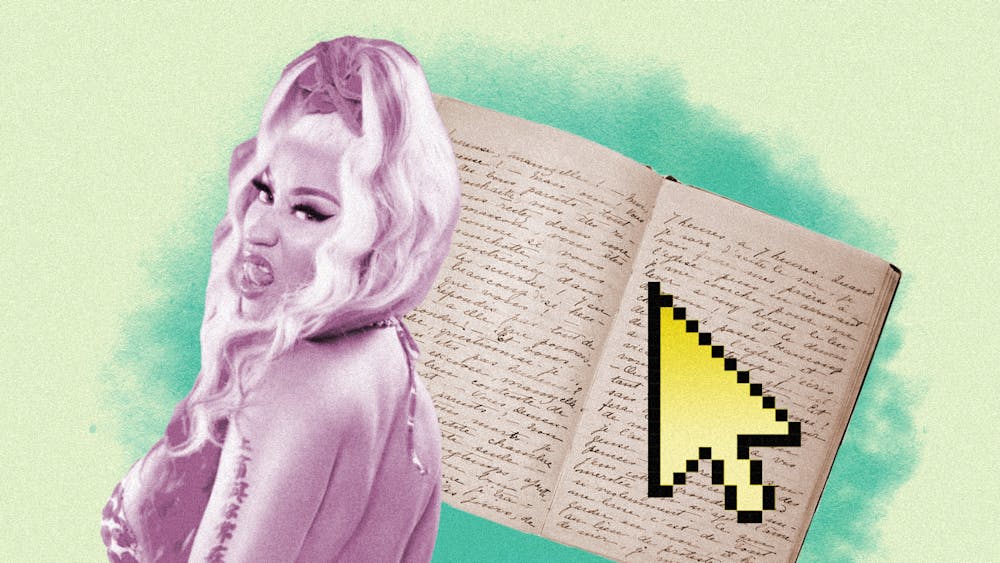“One thing about me is that my dad cheated on my mom and then had a baby with his 24–year–old mistress.”
In almost any context, hearing that sentence would spark a reaction of horror, anger, sadness, and the omnipresent sentiment that “men are evil.” However, with the new TikTok trend of people sharing embarrassing and traumatic stories to the beat of Nicki Minaj’s hit “Super Freaky Girl,” a story about parental infidelity is not horrific, but a fun and humorous watch.
“Super Freaky Girl,” Minaj’s latest single which samples Rick James’ 1981 funk classic “Super Freak” (the sampling here is almost as lazy as in Minaj’s 2014 smash “Anaconda,” although the latter had much better lyrics), has become a TikTok phenomenon. Minaj smartly only released a short clip of the song in anticipation of its release, which itself went viral. Once the full song came out, multiple TikTok dances were inevitably created and attempted by thousands of users, with varying results.
The song really exploded on the app once an instrumental version was put on YouTube. Then, people began playing that version in the background while they talked over the beat, trying (failing) to keep up with the rhythm as they told a story to the camera. This trend is where “Super Freaky Girl” really found its place on the platform.
The stories range from harmless fun like stories about embarrassing encounters with boys, to life–threatening accounts of people with diabetes fainting or a woman who didn’t get her period for over a year finding out she had an ovarian cyst the size of a melon, to deeply personal and traumatic tales, like one of a woman who grew up in a drug house and then discovered her mom was sleeping with the father of her child.
While watching these TikToks, I recognized myself becoming disappointed by videos that were not as outrageous or traumatic. Oh, your dad died? But he didn’t leave behind a secret family? No one cares. You had a stalker? But you smartly alerted the authorities before he could have a dangerous confrontation with you? Lame. I was quickly desensitized, and I wanted to see increasingly crazy and distressing stories.
Upon further reflection, I realized that the shock and awe of these stories was likely the creator’s intended effect, which worried me more than the initial stress of thinking I was a horrible human for wanting to hear about the awful things people have experienced.
The “Super Freaky Girl” trend is an example of the larger internet phenomenon of people finding solace in sharing their personal stories with total strangers online, or “trauma dumping,” to the world. Platforms like TikTok, YouTube, and Instagram have become people’s diaries; they’re public forums serving as an outlet for emotional release. Perhaps it’s easier to let things out into the abyss that is the online world, and maybe it’s less scary to share a secret with strangers than it is with the people closest to you, or even with yourself—but these practices may not be very healthy or safe.
Not everyone online is your friend, or will grant you compassion. Not everyone online will respect boundaries. In almost every comment section of these viral videos, there are comments begging for “PART 2!!” or asking for more increasingly private details. The strangers people are sharing with don’t care to know more about the person sharing the video—they see that person purely as a vessel to receive salacious information from. These people aren’t your friends, they’re not even your interlocutors—they’re your viewers, and they want your trauma, but don’t want to deal with your emotional fallout. Not to sound like your dad telling you to stay away from people online, but maybe don’t anticipate online followers to be a safe space in the way that a softcover journal or a licensed therapist would be.
This online “trauma dumping” has also been noticed by professionals. Yasmine Summan, a social media consultant, told Insider that sharing personal stories online is one of “the few ways [young people] know how to express their emotions, through apps where their parents or people from school can't see and judge them.” Summan does then add the caution that “people aren’t warning their audiences of what they're getting into.” This creates an unhealthy relationship between the poster and their audience, and could trigger a viewer’s trauma or prompt a hostile response. While it’s understandable that young people, who might feel most comfortable on social media, would feel safer talking into their phone than to a friend, their phone is not their friend, and social media doesn’t have anyone’s best interest at heart. It isn’t the comforting landing spot that young people have been trained to think it is.
Most of these videos are fun, and not dark, emotionally crippling stories. People should post whatever they want, and if people are comfortable with sharing their most personal stories with the world, more power to them. I’ve participated in the trend myself, and found it to be very funny to look back on an embarrassing memory. I just worry for people of my generation, who’ve grown up with social media, using these platforms as a memory book, a place to document life’s every milestone. Sharing graduations and birthdays is one thing, but not every aspect of your life needs to be unveiled to the lords of the internet. Sometimes, it might be better to cry into your pillow than into your cell phone—because unlike the people on the receiving end of what you’re telling your phone, your pillow will never use your stories against you.







